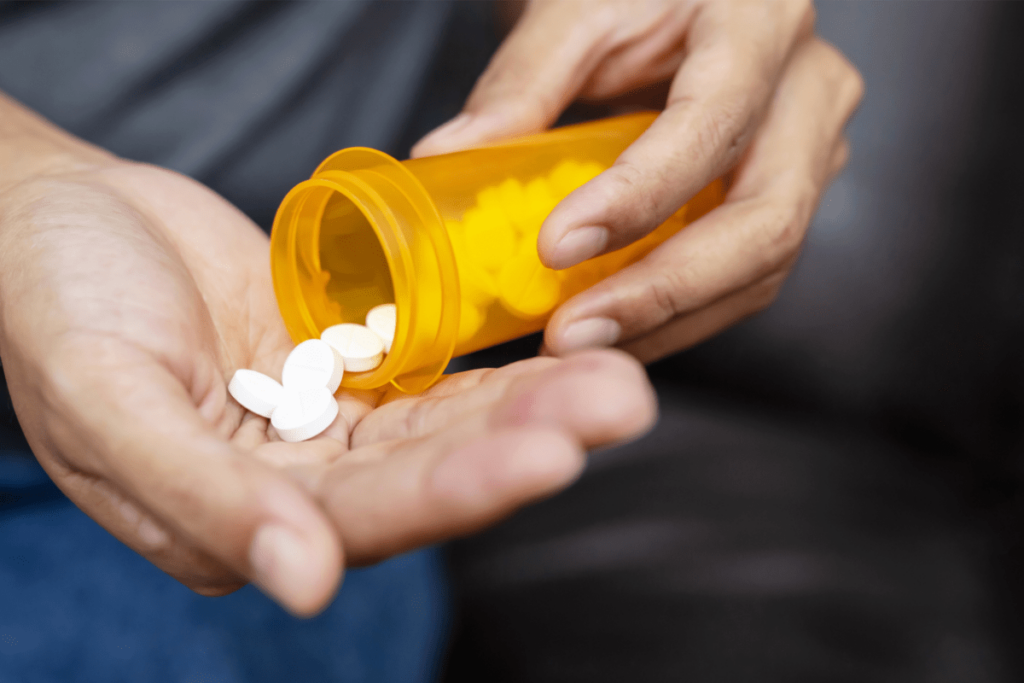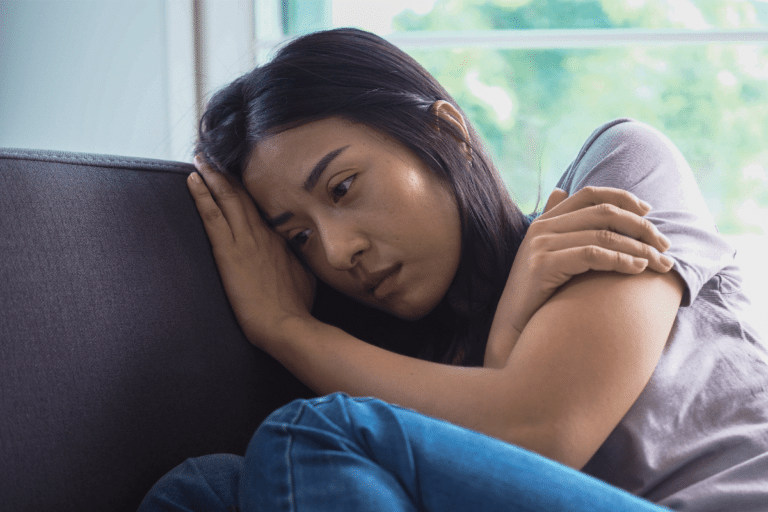Antidepressants are designed to help balance chemicals in the brain to treat depression and other mental health conditions. However taking more than the prescribed dose can lead to dangerous health risks.
Though not all antidepressants carry the same level of overdose risk, it is important to understand the potential dangers and what to do in the event of an overdose.
Can You Overdose on Antidepressants?
Yes, it is possible to overdose on antidepressants, and the consequences can range from mild discomfort to life-threatening conditions.
Antidepressants are generally safe when taken as prescribed. However, taking too many can overwhelm the body and lead to serious health complications. Each type of antidepressant carries its own risk of overdose, and the severity of an overdose depends on the specific medication, the amount taken, and the individual’s health.
Overdosing on antidepressants is more common when the medication is combined with other substances, such as alcohol, illicit drugs, or other prescription medications.
People with a history of depression or other mental health disorders may also be at a higher risk for overdose, especially if they misuse their medication. Knowing the risks and signs of an overdose is crucial in preventing a potential medical emergency.
How Do Antidepressants Work?
Antidepressants are medications used to treat mood disorders such as depression, anxiety, and sometimes chronic pain. They work by influencing neurotransmitters in the brain, such as serotonin, norepinephrine, and dopamine.
These chemicals regulate mood, emotions, and brain functions. By increasing or balancing these neurotransmitters, antidepressants can help stabilize mood and improve symptoms of depression and anxiety.
There are several types of antidepressants, including:
- Selective serotonin reuptake inhibitors (SSRIs): Increase serotonin levels.
- Serotonin-norepinephrine reuptake inhibitors (SNRIs): Boost serotonin and norepinephrine.
- Tricyclic antidepressants (TCAs): Affect serotonin, norepinephrine, and other neurotransmitters.
- Monoamine oxidase inhibitors (MAOIs): Inhibit the breakdown of neurotransmitters.
Learn more about common medications for mental health

What Happens If You Take Too Many Antidepressants?
If you take more than the prescribed amount of antidepressants, your body may struggle to process the excess, leading to potentially harmful effects. Overdosing on antidepressants can affect your heart, nervous system, and other vital organs. In severe cases, it can lead to life-threatening conditions such as seizures, heart failure, or coma.
Some antidepressants are more dangerous than others in high doses. For example, taking too many tricyclic antidepressants can be particularly hazardous, as they can lead to serious heart issues and extreme sedation.
More: What Happens If You Drink on Antidepressants
Which Antidepressants Have The Highest Risk of Overdose?
While any antidepressant can lead to an overdose if taken in excess, certain types have a higher risk.
Some of the antidepressants with a higher risk of overdose include:
- Tricyclic antidepressants (TCAs): These have been associated with severe overdoses, especially with medications like amitriptyline and imipramine.
- Monoamine oxidase inhibitors (MAOIs): These can interact dangerously with certain foods and other medications, increasing the risk of overdose.
- Serotonin and norepinephrine reuptake inhibitors (SNRIs): In higher doses, SNRIs like venlafaxine can also pose overdose risks. Common SNRIs include Cymbalta,
SSRIs tend to be safer in overdose situations but still present risks when taken in excess. Common SSRIs include Zoloft, Prozac, Celexa, Paxil.
How Many Antidepressants Does It Take To Overdose?
There is no exact number of pills that lead to an overdose because the amount varies based on the type of antidepressant, the dosage, and individual factors such as body weight, age, and overall health.
However, even doubling or tripling the prescribed dose can cause dangerous symptoms. For TCAs, taking just a few extra tablets can be life-threatening, while SSRIs may require a larger amount to cause serious harm.
Signs and Symptoms of Antidepressant Overdose
An overdose on antidepressants can present a range of symptoms, depending on the type of antidepressant and the amount taken. Common signs of overdose include:
- Confusion and disorientation
- Extreme drowsiness or difficulty staying awake
- Rapid or irregular heart rate
- Tremors or uncontrollable shaking
- Nausea and vomiting
- Seizures
- Blurred vision
- Hallucinations
- Difficulty breathing
- Coma
What To Do In An Emergency?
If you suspect someone has overdosed on antidepressants, seek emergency medical attention immediately. Call 911 or your local emergency services and provide as much information as possible, including the type of antidepressant taken, the amount, and the time of ingestion.
Do not try to induce vomiting unless directed by a healthcare professional, as this can cause further harm.
Is Antidepressant Overdose Dangerous?
Yes, an overdose on antidepressants can be extremely dangerous. The severity depends on the type of antidepressant, the amount taken, and how quickly medical help is received. Antidepressant overdoses can lead to long-term health issues, including organ damage, neurological damage, or even death if not treated promptly.
Factors That Increase The Risk of Overdose
Several factors can increase the likelihood of an antidepressant overdose, including:
- Mixing medications: Combining antidepressants with other medications, alcohol, or illicit drugs can increase overdose risk.
- Existing health conditions: People with heart or liver issues may be more susceptible to overdose.
- Mental health struggles: Depression and other mental health disorders can lead to suicidal thoughts, increasing the risk of intentional overdose.
- Improper dosing: Taking more than the prescribed dose, whether accidentally or on purpose, raises the risk.
Immediate Treatment Options for Antidepressant Overdose
If someone is experiencing an antidepressant overdose, immediate medical intervention is crucial.
The faster treatment is administered, the higher the chances of preventing serious complications or death.
Here are the immediate treatment options commonly used in emergency situations:
- Activated charcoal: If administered within an hour or two of the overdose, activated charcoal can help prevent the body from absorbing more of the antidepressant. This treatment binds to the drug in the stomach and intestines, reducing its effects.
- Gastric lavage (stomach pumping): In more severe cases, doctors may perform gastric lavage to physically remove the remaining drug from the stomach. This treatment is most effective if done soon after ingestion.
- Medications: Depending on the type of antidepressant and symptoms of the overdose, specific medications may be given to control life-threatening symptoms. For example, medications can be administered to treat seizures or stabilize an irregular heartbeat.
- Intravenous fluids: IV fluids may be administered to maintain blood pressure, hydration, and kidney function while flushing the drug out of the system.
- Continuous monitoring: Patients are often monitored in an intensive care unit (ICU), where doctors can closely observe heart rate, blood pressure, breathing, and organ function. Ventilation support may be provided if the person is struggling to breathe.
After Medical Treatment: Detox & Residential Treatment
After the immediate crisis of an antidepressant overdose is managed, ongoing care is essential to address the underlying causes and prevent future incidents. Post-emergency treatment may include detoxification and mental health treatment in a residential facility.
Detox
Detox is often the first step in recovering from an antidepressant overdose, especially if the client has been misusing the medication.
The detox process involves the safe removal of antidepressants from the body under medical supervision. Detox programs are designed to minimize withdrawal symptoms, such as anxiety, irritability, or flu-like symptoms, which can occur when stopping the medication abruptly.
- Medical supervision: During detox, healthcare providers will closely monitor the individual to ensure the process is as safe and comfortable as possible.
- Withdrawal management: If withdrawal symptoms become severe, medications may be provided to help ease the discomfort.
While detoxification is a necessary first step, it doesn’t address the mental health issues that may have led to the overdose. For long-term recovery, further treatment is essential.
Residential Mental Health Treatment
Following detox, residential mental health treatment is highly recommended for individuals recovering from an antidepressant overdose. This type of treatment offers a structured environment where patients receive round-the-clock care and support. Residential programs help address both the mental health conditions and any underlying factors contributing to medication misuse.
- Psychiatric care: A team of psychiatrists will reassess the individual’s mental health needs and adjust any medication treatment plans as needed. Properly managed medications can help prevent future misuse and overdose.
- Therapy: Cognitive-behavioral therapy (CBT), dialectical behavior therapy (DBT), and individual or group therapy are commonly offered to help individuals cope with depression, anxiety, or other co-occurring disorders.
- Holistic treatments: Many residential programs also offer holistic therapy approaches like mindfulness, meditation, and exercise therapy to help individuals heal both mentally and physically.
After completing residential treatment, clients can continue with outpatient programs, support groups, or counseling to ensure lasting recovery and mental well-being.
Seek Help for Antidepressant Overdose Today
If you or a loved one is struggling with the misuse of antidepressants or has experienced an overdose, it’s important to seek professional help.
Arbor Wellness provides top mental health treatment in Nashville for those struggling with mental health and dual diagnosis disorders. Call us now at 629-2187-2658 or verify your insurance.

















